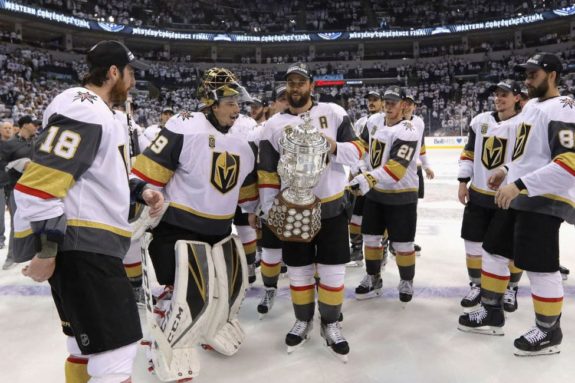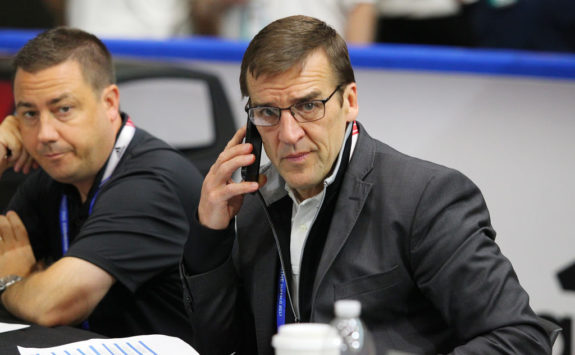From worst (i.e., non-existence) to first, the Vegas Golden Knights’ meteoric rise is nothing short of incredible.
Some NHL fans might be sick of the constant chatter surrounding the Golden Knights’ Cinderella story. Their success rightfully induces feelings of jealousy for some. They are just four games away from winning the Stanley Cup without suffering through any kind of organizational pain.

Even if they haven’t suffered like most fan bases, the residents of Las Vegas did have to soldier on after the deadliest mass shooting in U.S. history. That statement is apples to oranges, but it’s something worth considering when that notion creeps into your conscience.
Another reason for disgruntled fans of middling teams to cheer up is because the Vegas story is one of instant success. Other teams around the NHL have spent years trying to build a contender, but the Golden Knights’ model provides hope of a quick turnaround for some clubs.
The Golden Knights’ Rapid Ascension
Think about the Golden Knights’ Conference Final matchup against the Winnipeg Jets. One was a team that spent years diligently drafting in order to contend for the Cup. While cheering for the Jets made sense from a Canadian point of view, is their model really the one you want to root for? Years and years of pain before your draft picks finally pan out, if they pan out at all?
Across the NHL, the logical train of thought is that you have to draft and develop players in order to be successful. You can complement your core through trades, but it’s not very often that teams give up top-end talent that way.
Unless you’re Dale Tallon, that is.

Free agency has become a danger zone for many clubs, and bad deals have proven to be detrimental to some teams’ success. One of the only teams that was semi-successful through free agency was the New York Rangers. Even they swung and missed on a few players, and themselves have made the commitment to rebuilding through the draft.
All of this makes the Vegas story that much more remarkable. Teams don’t just win championships by acquiring players through transactions. Of course the Vegas circumstances are different, but they’ve managed to find a way to win when no one thought they would.
If you cheer for a team that’s tired of losing, seeing Vegas reach lofty heights with a rag-tag group of players provides more hope than the Winnipeg model.
Does the Vegas Model Provide False Hope?
Since Vegas was able to win with a group that wasn’t built through the draft, that means every other non-playoff team can breathe a sigh of relief, right?
The vision of a quick turnaround for downtrodden franchises can spark the imaginations of not just fans, but executives as well. Just look at Vancouver Canucks owner Francesco Aquilini highlighting success stories from Colorado and New Jersey, even when that notion seems unrealistic.
Look at Colorado and New Jersey this year, making the playoffs. Look at Arizona in the second half of the season. Look at our last 10 games. 12/15
— Francesco Aquilini (@fr_aquilini) April 9, 2018
Aquilini’s visions of taking a bottom-feeder back to the playoffs in a fortnight seems about as realistic as Olli Juolevi being the dreaded video-game addict. Not that Vegas was ever a bottom-feeder, but their odds to win the Stanley Cup at the beginning of the season were right down at the bottom of the list with the Avs and Devils.
Now just because those three underrated teams made the postseason, does that mean the other three bottom-feeders from those prognostications (the Detroit Red Wings, Canucks, and Arizona Coyotes) should start getting giddy about their teams?
The reality is that so many factors worked in Vegas’s favour throughout the season, aside from their surprisingly successful expansion draft. Out of 22 skaters to play 30 games or more, 15 of those players posted career-highs in points with the Golden Knights. Of the seven players that didn’t hit a career-high in points, four of them (Luca Sbisa, Brayden McNabb, James Neal, and Cody Eakin) improved upon last season’s total.
The fact that nearly 70 percent of their players posted a career-high in points is a feat that may never be met again in NHL history. Whether it was more opportunity, motivation, pride, or optimal usage, the Golden Knights had almost their entire team perform above expectations.
That doesn’t even take into account the goaltenders. The backups gave Vegas a fighting chance when Marc-Andre Fleury was injured. When Fleury returned, he posted a .927 save percentage, the best of his career.

What’s more realistic about Vegas being a copy-cat organization of sorts, is that teams should start targeting undervalued and underused players. There are plenty or players that are buried on good teams who could benefit from an increased role in another organization.
That’s one way that teams like the Canucks could emulate the Vegas model. Other than that, banking on 70 percent of your roster to post career-best point totals is about as safe as banking on winning the lotto.